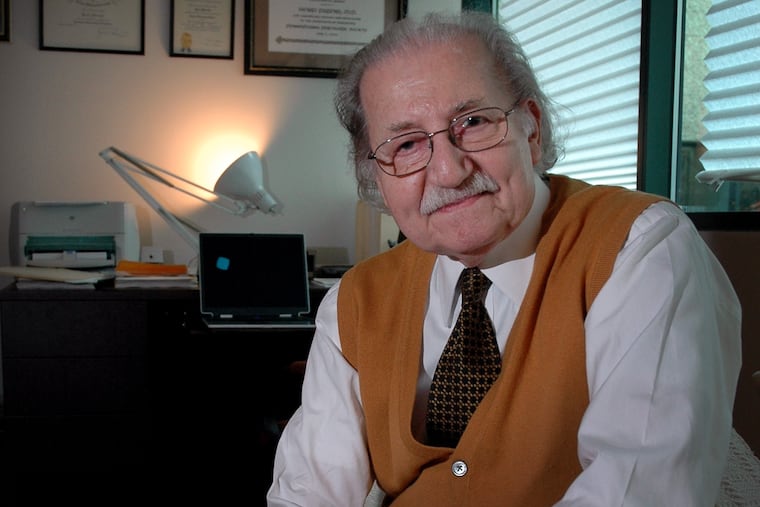Henri Parens, groundbreaking psychiatrist and psychoanalyst, author, and inspirational Holocaust survivor, dies at 93
Separated from his family when he was a boy, he counseled, lectured, and wrote about relationships, especially those between children and their parents. "The ability to be empathetic" is key, he said.

Henri Parens, 93, formerly of Wynnewood, a celebrated professor of psychiatry at Thomas Jefferson University, research professor of psychiatry at the Medical College of Pennsylvania, analyst at the Psychoanalytic Center of Philadelphia, prolific author, and Holocaust survivor, died Saturday, Feb. 19, of congestive heart failure at an assisted living center in Minneapolis.
Dr. Parens escaped alone from a detention camp in France when he was 12, made his way to the United States at 13, and never again saw his parents, older brother, or other relatives. Motivated by his horrific experiences as a child during the Holocaust, and inspired by the bravery and selflessness of his mother, who encouraged his escape, and those who aided him along the way, he dedicated the rest of his life to helping children, parents, and others understand and manage despair, prejudice, aggression, and other destructive behavior.
As a private psychiatrist and psychoanalyst for more than 50 years, he specialized in treating children with psychological trauma and was known by many as “the father of parenting education.” He lectured, held workshops, and directed research groups on family relationships and other issues around the world and served with the United Nations and other global organizations to stymie what he called the “malignant prejudice” of ethnic hatred and genocide.
As director of the infant psychiatry section at the Medical College of Pennsylvania, now the Drexel College of Medicine, Dr. Parens counseled parents to “keep telling [your children] and showing them that you love them, but give them the space they want. Don’t push too hard. They’ll make the move when they’re ready.”
Longtime Inquirer columnist Darrell Sifford followed that advice and wrote in 1988: “I’ll forever be indebted to [Dr. Parens] for his support and encouragement during the bleak times when I was struggling to reconcile with my sons after their mother and I divorced.”
He published a dozen books, including The Development of Aggression in Early Childhood in 1979, his 2004 memoir, Renewal of Life: Healing from the Holocaust, and War Is Not Inevitable: On the Psychology of War and Aggression in 2014. He also wrote, edited, and contributed to nearly 300 books, articles and papers; was quoted extensively in The Inquirer and other publications; and became involved with podcasts, scientific films, documentaries, a TV series, and other projects.
His six-unit textbook, Parenting for Emotional Growth, first published in 1995, and accompanying materials were designed specifically to provide a curriculum for parenting education “alongside reading, writing, and arithmetic in the primary and secondary education of every child.” Versions of it have been adopted by schools in the Philadelphia area, New York, Illinois, Alaska, and elsewhere, and it’s online contents have been downloaded in nearly 100 countries.
He won many awards, including the 1993 Miriam Jones Brown World of the Child Award from Friends School Haverford, and the 2019 Sigourney Award for outstanding contributions to psychoanalysis. The Henri Parens Hope Scholarship was created in his honor by the Psychoanalytic Center of Philadelphia for students who plan to “improve the lives of individuals, especially children and the underserved.”
Referring to the Miriam Jones Brown Award, Betty-Ann Workman, then the principal at Friends School Haverford, told The Inquirer in 1993: “Dr. Parens… helps adults understand the world of the child, which has a slightly different twist to it. It is switching the gears, and I think he does this magically.”
Born Henri Pruszinowski in Lodz, Poland, in 1928, Dr. Parens lived with two families in Pittsburgh after he arrived in the United States in 1942. A singer and pianist as a young man, he earned a bachelor’s degree in music at Pittsburgh’s Carnegie Tech, now Carnegie Mellon University, in 1952.
He served two years in the Army as a medic in Germany after college, and, thinking that medicine would be more reliable than music to support the family he wanted, he obtained his medical degree at Tulane University Medical School in 1959.
He met Rachel Anto through mutual friends, and they married in 1955. They had sons Erik, Karl, and Joshua, and he completed his residency in Cincinnati before joining the Medical College of Pennsylvania as a research professor of psychiatry in 1969.
He moved to Jefferson as a professor of psychiatry in 1992 and retired in 2017. Colleagues called him “a mensch in the literal sense of the word,” and said in a tribute: “His ideas frequently provided the capstone in the arch of human understanding.”
He spoke French, accompanied himself on the piano and sang often at home. He liked to wear vests and hats indoors because he was sensitive to cold, and painstakingly named all the researchers who collaborated with him over the years when asked about his success.
His son, Erik, said: “He became an eloquent and tireless warrior for promoting the flourishing of all.”
In addition to his wife and sons, Dr. Parens is survived by eight grandchildren and other relatives.
A memorial service is to be held in April.
Donations in his name may be made to the Henri Parens Hope Scholarship at the Psychoanalytic Center of Philadelphia, 3810 Mt. Pleasant Dr., Philadelphia, Pa. 19121, and the International Rescue Committee, P.O. Box 6068, Albert Lea, Minn. 56007.
.